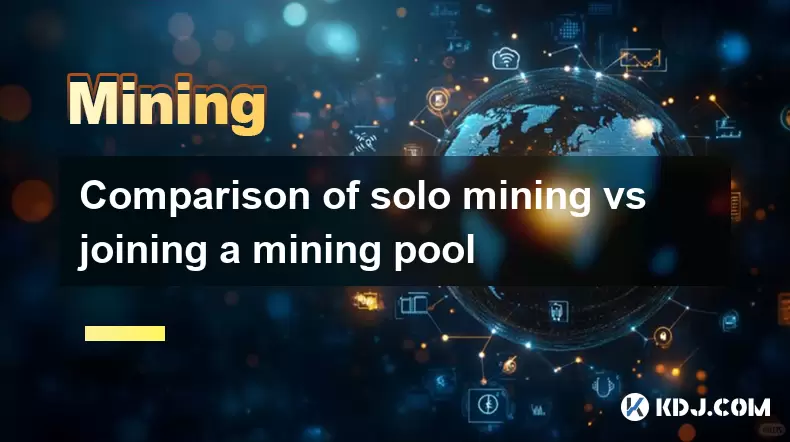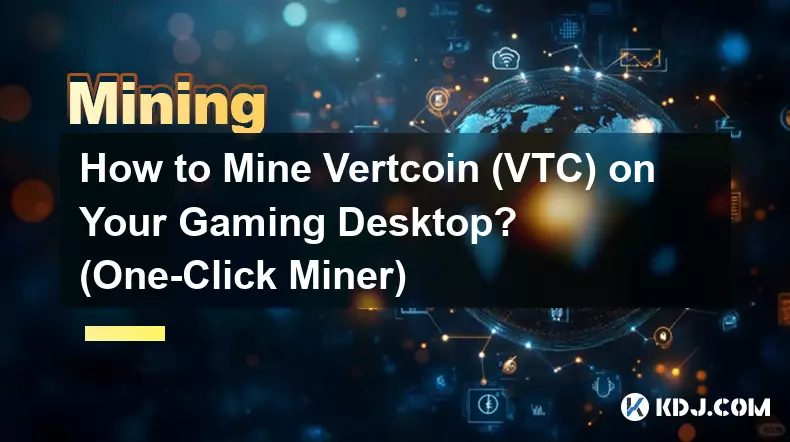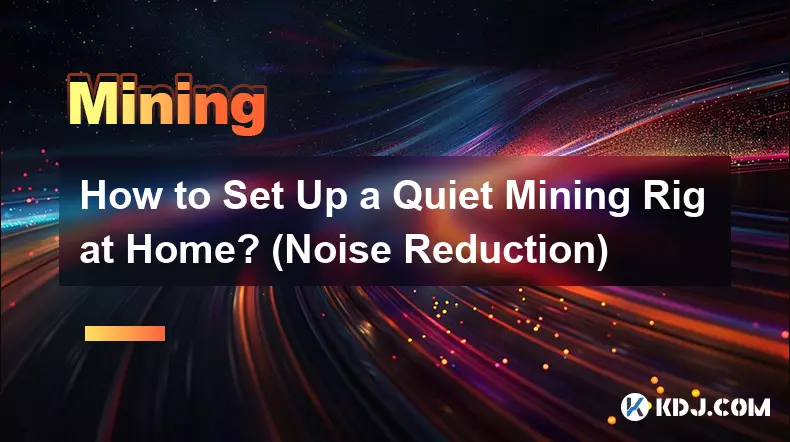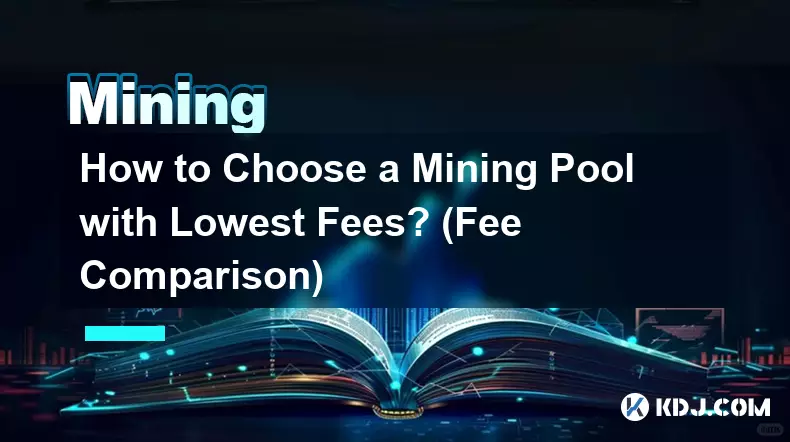-
 bitcoin
bitcoin $87959.907984 USD
1.34% -
 ethereum
ethereum $2920.497338 USD
3.04% -
 tether
tether $0.999775 USD
0.00% -
 xrp
xrp $2.237324 USD
8.12% -
 bnb
bnb $860.243768 USD
0.90% -
 solana
solana $138.089498 USD
5.43% -
 usd-coin
usd-coin $0.999807 USD
0.01% -
 tron
tron $0.272801 USD
-1.53% -
 dogecoin
dogecoin $0.150904 USD
2.96% -
 cardano
cardano $0.421635 USD
1.97% -
 hyperliquid
hyperliquid $32.152445 USD
2.23% -
 bitcoin-cash
bitcoin-cash $533.301069 USD
-1.94% -
 chainlink
chainlink $12.953417 USD
2.68% -
 unus-sed-leo
unus-sed-leo $9.535951 USD
0.73% -
 zcash
zcash $521.483386 USD
-2.87%
Comparison of solo mining vs joining a mining pool
Solo mining offers full rewards but requires significant resources, while mining pools provide steady income with shared profits.
Jul 05, 2025 at 07:17 pm

Understanding the Basics of Cryptocurrency Mining
Cryptocurrency mining involves validating transactions and adding them to a blockchain through computational power. Miners use specialized hardware, such as ASICs or GPUs, to solve complex cryptographic puzzles. Upon successfully solving these puzzles, miners are rewarded with newly minted coins. This process is central to the functioning of many decentralized networks like Bitcoin and Ethereum.
There are two primary methods for participating in this process: solo mining and joining a mining pool. Each approach has its own set of advantages and disadvantages, depending on factors such as computational power, consistency of rewards, and network difficulty.
What Is Solo Mining?
Solo mining refers to the practice where an individual miner attempts to mine blocks independently without collaborating with others. In this scenario, the miner retains 100% of the block reward if they succeed in finding a valid block. However, due to the increasing difficulty of modern blockchains, solo mining is often not feasible for small-scale miners.
- High initial investment: Requires powerful hardware.
- Unpredictable income: Long intervals between potential rewards.
- Full control over operations: No sharing of profits or decision-making with others.
Solo mining is best suited for those who have access to high hash rates, low electricity costs, and a deep understanding of mining software configuration.
What Is a Mining Pool?
A mining pool is a collaborative effort among multiple miners who combine their computational resources to increase the likelihood of discovering new blocks. When a block is found by any member of the pool, the reward is distributed among participants based on their contributed hash rate.
- Steadier income stream: More frequent but smaller payouts.
- Lower variance in earnings: Reduces the risk of long dry spells.
- Pool fees involved: A percentage (typically 1–2%) is deducted from each reward.
Joining a mining pool significantly lowers the barrier to entry for individuals with limited resources, making it a popular choice among casual or part-time miners.
Key Differences Between Solo Mining and Mining Pools
The core distinction lies in reward distribution and predictability. While solo mining offers potentially larger rewards, the probability of earning them is very low unless you have substantial computing power. On the other hand, mining pools provide more consistent returns, albeit at a reduced amount per payout.
Another critical factor is block discovery frequency. Solo miners may go weeks or months without finding a block, while pool members earn regularly, even if the individual payments are smaller.
Network difficulty also plays a major role. As more miners join the network, the difficulty adjusts upward, making solo mining increasingly impractical for most users.
Technical Considerations for Solo Mining Setup
Setting up a solo mining operation requires careful planning and execution. Here’s a step-by-step guide:
- Choose compatible mining hardware: Ensure your ASIC or GPU supports the algorithm used by the target cryptocurrency.
- Install mining software: Use software like CGMiner, BFGMiner, or Awesome Miner configured for solo mode.
- Set up a full node: Run a local copy of the blockchain to validate transactions independently.
- Configure mining pool settings to solo mode: Some software allows switching modes via configuration files.
- Monitor performance: Use tools like Minerstat or Awesome Miner to track hash rate and uptime.
Each of these steps must be executed precisely to avoid errors or inefficiencies.
Technical Considerations for Joining a Mining Pool
To participate in a mining pool, follow these procedures:
- Select a reputable pool: Research options like F2Pool, Antpool, or Slush Pool based on fees, server locations, and payout schemes.
- Register an account: Most pools require basic registration details and wallet addresses.
- Configure mining software: Input the pool address, port number, username, and password into your mining application.
- Optimize connection: Choose the nearest server location to minimize latency.
- Track earnings and statistics: Use the pool’s dashboard to monitor daily payouts and efficiency metrics.
Some pools offer additional features like auto-switching algorithms or merged mining, which can enhance profitability.
Financial Implications of Each Method
From a financial perspective, solo mining demands higher upfront costs and longer break-even periods. The electricity cost becomes a crucial determinant since solo mining may not yield regular returns.
Mining pools, although charging a fee, tend to deliver more predictable revenue. This makes budgeting easier for miners who rely on mining as a source of income. It’s essential to compare payout structures, such as Pay Per Share (PPS), Proportional, or Score-based systems, to choose a model that aligns with your goals.
Frequently Asked Questions (FAQ)
Q: Can I switch between solo mining and mining pools?Yes, you can switch between the two methods by reconfiguring your mining software. However, changing frequently may affect overall efficiency and earnings consistency.
Q: Does solo mining require running a full node?Yes, for true solo mining, you need to run a full node to independently validate blocks and submit solutions directly to the network.
Q: Are there cryptocurrencies better suited for solo mining?Smaller or less competitive coins with lower network difficulty, such as certain altcoins, may still be viable for solo mining with modest hardware setups.
Q: How do mining pools distribute rewards fairly?Most pools use a share-based system, where each miner submits proof of work called “shares.” Rewards are then allocated proportionally based on the number of valid shares submitted during a round.
Disclaimer:info@kdj.com
The information provided is not trading advice. kdj.com does not assume any responsibility for any investments made based on the information provided in this article. Cryptocurrencies are highly volatile and it is highly recommended that you invest with caution after thorough research!
If you believe that the content used on this website infringes your copyright, please contact us immediately (info@kdj.com) and we will delete it promptly.
- Zama Lists on Multiple Exchanges, Airdrop Window Opens Amidst Strong Auction Performance
- 2026-02-02 19:05:01
- Bitcoin's Plunge Spurs Whale Activity Amidst Liquidity Crunch: A New York Take
- 2026-02-02 19:10:02
- Token Market Evolution: Digital Finance and RIV Files Usher in Era of Institutional Trust
- 2026-02-02 19:05:01
- ZAMA Token's Imminent Launch: A Price Prediction and Analysis Amidst Shifting Crypto Tides
- 2026-02-02 19:00:02
- Binance's SAFU Fund Goes Bitcoin-Heavy: A Bold Move for User Protection and Bitcoin Investment
- 2026-02-02 19:00:02
- Bitcoin's Big Dip: From Peak Hopes to Present Plunge
- 2026-02-02 18:55:01
Related knowledge

How to Spot a Cloud Mining Scam? (Red Flags to Watch For)
Feb 02,2026 at 08:20am
Unrealistic Return Promises1. Platforms advertising guaranteed daily returns above 1–2% without disclosing underlying hardware, electricity costs, or ...

How to Earn Passive Income with DePIN Mining? (New Trend 2026)
Feb 01,2026 at 12:40pm
Understanding DePIN Mining Mechanics1. DePIN mining relies on real-world infrastructure participation rather than computational hashing. Users deploy ...

How to Mine Vertcoin (VTC) on Your Gaming Desktop? (One-Click Miner)
Feb 02,2026 at 03:39am
Understanding Vertcoin's Mining Algorithm1. Vertcoin uses the Verthash algorithm, which is intentionally memory-hard and designed to resist ASIC domin...

How to Set Up a Quiet Mining Rig at Home? (Noise Reduction)
Feb 01,2026 at 11:00pm
Acoustic Enclosure Design1. Use rigid, dense materials such as MDF or acoustic-grade plywood for the enclosure walls to block mid-to-high frequency no...

How to Choose a Mining Pool with Lowest Fees? (Fee Comparison)
Feb 02,2026 at 02:39am
Understanding Mining Pool Fee Structures1. Pool operators charge fees to cover infrastructure, maintenance, and administrative costs. These fees manif...

How to Mine Bitcoin on Mac (M1/M2/M3)? (Software Tutorial)
Feb 01,2026 at 07:19pm
Understanding Bitcoin Mining on Apple Silicon1. Bitcoin mining relies on solving cryptographic puzzles using computational power, and Apple’s M1, M2, ...

How to Spot a Cloud Mining Scam? (Red Flags to Watch For)
Feb 02,2026 at 08:20am
Unrealistic Return Promises1. Platforms advertising guaranteed daily returns above 1–2% without disclosing underlying hardware, electricity costs, or ...

How to Earn Passive Income with DePIN Mining? (New Trend 2026)
Feb 01,2026 at 12:40pm
Understanding DePIN Mining Mechanics1. DePIN mining relies on real-world infrastructure participation rather than computational hashing. Users deploy ...

How to Mine Vertcoin (VTC) on Your Gaming Desktop? (One-Click Miner)
Feb 02,2026 at 03:39am
Understanding Vertcoin's Mining Algorithm1. Vertcoin uses the Verthash algorithm, which is intentionally memory-hard and designed to resist ASIC domin...

How to Set Up a Quiet Mining Rig at Home? (Noise Reduction)
Feb 01,2026 at 11:00pm
Acoustic Enclosure Design1. Use rigid, dense materials such as MDF or acoustic-grade plywood for the enclosure walls to block mid-to-high frequency no...

How to Choose a Mining Pool with Lowest Fees? (Fee Comparison)
Feb 02,2026 at 02:39am
Understanding Mining Pool Fee Structures1. Pool operators charge fees to cover infrastructure, maintenance, and administrative costs. These fees manif...

How to Mine Bitcoin on Mac (M1/M2/M3)? (Software Tutorial)
Feb 01,2026 at 07:19pm
Understanding Bitcoin Mining on Apple Silicon1. Bitcoin mining relies on solving cryptographic puzzles using computational power, and Apple’s M1, M2, ...
See all articles










































































